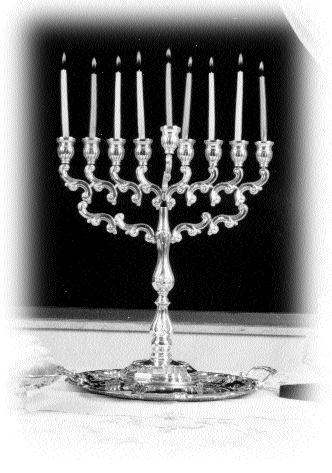Elimination Or Illumination
 Fire
consists of two powers - the power to burn, and the power to illuminate. In the
days of Chanukah,
the Chashmonaim used both of these powers. Fire to sear and eradicate
the impurity
of the Greeks, and the fire of the Torah to light up the Beis
Hamikdash (Holy Temple) once it had been re-sanctified.
Fire
consists of two powers - the power to burn, and the power to illuminate. In the
days of Chanukah,
the Chashmonaim used both of these powers. Fire to sear and eradicate
the impurity
of the Greeks, and the fire of the Torah to light up the Beis
Hamikdash (Holy Temple) once it had been re-sanctified.
A fire to burn out Evil, and a fire to illuminate Good.
There is a famous dispute between Beis Shammai and Beis Hillel as to how to light the Chanukah candles: Beis Shammai says that you start with eight candles on the first night and work down to one on the last. Beis Hillel says you start with one and work up to eight.
The power to burn always starts with much and reduces it to nothing, to ashes. That's the idea of starting with eight candles and reducing them to nothing: Beis Shammai held that the essential aspect of Chanukah to be communicated to future generations was that you can't leave even the tiniest part of evil in the world. It must be burned until it is totally eradicated, for then Good will blaze out and shine.
The power of light, however, is always something which grows stronger and stronger: Beis Hillel considered that the lighting of the chanukia should stress the triumph of the light - for where there is light, the darkness must flee. So Beis Hillel holds we should light one candle on the first night, and then that light grows and grows until it fills the world and there is no place left for the darkness.
Yosef's two sons, Ephraim and Menashe, are these two powers of fire and light rooted in all of Israel. Menashe is the "negative" power, the power to burn and destroy evil, with the result that the light will shine. And Ephraim is the "positive" power; the power to illuminate, so that darkness can have no place to rule.
Just as ultimately the Jewish People will be called by the name Ephraim, the power of illumination, similarly, the halacha follows Beis Hillel, to start with one candle and add more light every night until the darkness disappears.
Sources: Rabbi Shlomo Yosef Zevin in L'Torah Ul'Moadim






